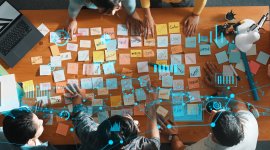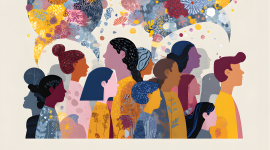Promoting Equity: Breaking Barriers to Diversity, Inclusion and Non-Discrimination

Photo © Adobe Stock/Cienpies Design
Promoting Equity: Breaking Barriers to Diversity, Inclusion and Non-Discrimination
13–24 October 2025
The course is available in English
Introduction to the course
The International Labour Organization promotes non-discrimination and equal opportunity, in line with Sustainable Development Goal 10 (reducing inequalities) and the "Leaving No One Behind" principle. These values uphold the right to well-being, dignity, and economic security for all. Growing attention to widening inequalities and evolving socio-economic challenges have intensified the need to advance inclusion and prevent discrimination, not only for social justice but also for economic sustainability. This training equips participants to foster fairness by embedding nondiscriminatory practices and addressing intersectional biases. It explores key ILO conventions, including Convention n. 111, and guides the development of inclusive strategies across individual, team, and organizational levels. The course also introduces the role of technology, including AI, in promoting equity in the workplace. Participants will examine how digital tools can support fairer recruitment, inclusive communication, and decision-making, while also learning how to identify and mitigate the risks of algorithmic bias.
Who attends this course?
This course is ideal for professionals working to promote fairness, equity, and inclusion in the workplace, including: HR specialists and recruiters aiming to build inclusive hiring and retention practices DEI officers and focal points responsible for strategy and implementation Team leaders, trainers, and change agents supporting diverse teams and inclusive culture Government officials, UN staff, and NGO professionals advancing equality through policy or programming Private sector leaders and CSR practitioners committed to ethical and inclusive workplaces
Course Structure and Content Overview
This is a blended learning course, combining an online preparatory phase with an intensive face-to-face training week. The blended format allows participants to build foundational knowledge before engaging in deeper, practice-oriented sessions in person. This phase ensures that all participants arrive at the face-to-face sessions with a shared understanding of terminology and key issues, ready to engage with applied content and group work.
Online Phase: Setting the Scene
The online phase, accessible through our digital learning platform, will introduce key concepts and frameworks related to diversity, equity, and inclusion (DEI). It will include short readings, interactive activities and one 1.5 webinar focused on:
- The basics of non-discrimination and international standards (including ILO Convention 111)
- Foundational concepts of DEI
- Initial self-assessment and reflection on participants' leadership approaches and DEI challenges in their professional contexts
Face-to-Face Phase: Programme Overview
Day 1: The Foundations of Inclusion
- Intersectionality as the Foundation of Non-Discrimination: Understanding how overlapping identities (e.g., gender, race, disability) shape experiences and contribute to workplace disparities.
- Lead with Purpose: Core Principles of Inclusive Leadership: Assessing leadership styles and learning how to adapt them for greater inclusion in diverse teams.
- Microaggressions and Allyship in Action: Skills and Scenarios: Identifying microaggressions in the workplace and developing strategies for allyship to foster a more inclusive environment.
Day 2: Communicating Inclusion: Leading with Clarity and Impact
- Communicating Inclusively and Accessibly: Practical strategies for inclusive communication that promote respect and accessibility across diverse teams, including the use of digital communication channels.
- Creating Safe and Inclusive Spaces Through Verbal and Non-Verbal Communication: Understanding the importance of tone, body language, and non-verbal cues in creating safe, inclusive workspaces.
- Resolving Conflict in Global Teams: Exploring techniques for addressing conflicts that arise in culturally diverse teams, promoting respectful dialogue, and understanding different perspectives.
Day 3: Shaping Inclusive Teams: Leading and Managing Diversity
- Inclusive Hiring Practices: Strategies for crafting bias-free job descriptions, expanding recruitment outreach, and conducting fair interviews to attract diverse talent.
- Beyond Hiring: Building Cultures Where Diverse Talent Thrives: Focusing on mentorship programs, equitable performance reviews, and creating a culture that supports the professional development of diverse employees.
Day 4: Building Inclusive Systems and Practices
- Engines of Change: The Role of ERGs and Their Sponsors: Examining how Employee Resource Groups (ERGs) and their sponsors can serve as key drivers of diversity, equity, and inclusion within organizations.
- Bias by Design? AI Bias Mitigation: Exploring how bias can manifest in digital tools, particularly in HR and recruitment systems, and discussing ways to mitigate it.
- From Theory to Practice: Crafting Your DEI Vision & Purpose: Turning theory into actionable steps by creating your organization’s DEI vision and aligning it with long-term objectives.
Day 5: From Strategy to Action
- Where We Stand: Assessing and Setting DEI Goals for Impact: Techniques for measuring progress, setting specific DEI goals, and assessing the effectiveness of current initiatives.
- From Strategy to Action: Building, Implementing, and Sustaining Your DEI Roadmap: Developing a comprehensive action plan to implement and sustain diversity, equity, and inclusion initiatives within your organization.
Why should I join?
By joining this training, participants will:
- Have a set of ready-to-use tools and templates for designing inclusive systems and practices
- Be able to identify and mitigate bias, including in digital tools and decision-making processes
- Feel more confident in facilitating inclusive team dynamics and promoting culture change
- Receive tailored feedback and join a global community of D&I practitioners
- Earn an ITCILO Certificate of Achievement, which contributes to the Diploma in Gender Equality, Diversity and Inclusion
Funding
A limited number of partial fellowships are available for worthy candidates from countries ODA receiving countries (Official Development Assistance). Consult the updated recipients’ list here.
If you are applying for funding, please specify so in your application form.


